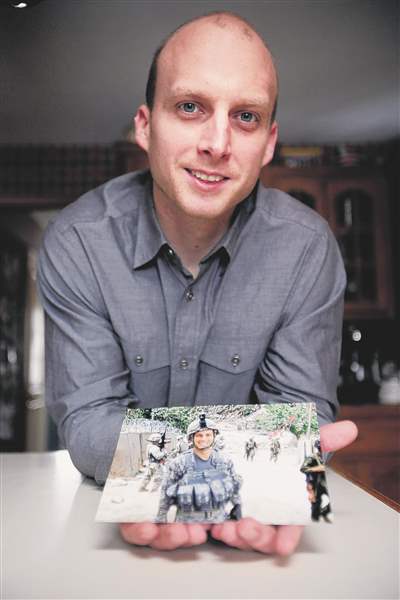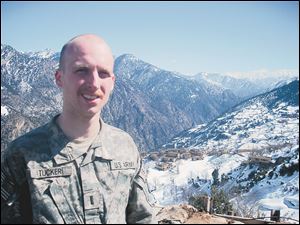
Area soldier lived through attack detailed in journalist Jake Tapper's book ‘Outpost’
1/14/2013
Kyle Tucker, of Sylvania, poses with a picture of himself during his 2008 deployment to Afghanistan.
THE BLADE/ZACK CONKLE
Buy This Image

Jake Tapper, now with CNN, said he wanted to not only recognize soldiers who served but put their stories in the hands of Americans who have all but forgotten about the war that continues.
Kyle Tucker hasn’t read through the new book detailing the experiences of soldiers stationed at Combat Outpost Keating in Afghanistan.
He doesn’t really have to. He lived it.
And because of that he already knows what readers of The Outpost: An Untold Story of American Valor realize quickly enough.
“It’s not pleasant,” he said.
Sitting in his Sylvania home thousands of miles and several years removed from his service in Afghanistan, Tucker said he hasn’t spoken much about his months spent in a combat zone. But upon learning that the camp where he was stationed in a remote expanse of Afghani mountains was to be the subject of a book, he offered to share stories of his deployment.
Tucker was among more than 225 people interviewed for the 673-page book written by journalist Jake Tapper and released in November. Starting at the creation of the outpost, Tapper tells the story of sacrifice made by men stationed there and culminates with the deadly attack in October, 2009, that claimed the lives of eight soldiers.

Kyle Tucker in the Afghan mountains above Combat Outpost Keating.
“You find out as a member of the military that there is an unwritten rule that people don’t ask you about your deployment. I think many people don’t know how to approach you,” Mr. Tucker, 28. “This [book] has got a lot of people talking.”
‘Madness’
Located in a valley and surrounded by mountains, Combat Outpost Keating was created by the military in the summer of 2006 to both stop Taliban fighters flowing in from nearby Pakistan and to “win over the locals,” Tapper writes in the book’s opening pages. But while the intentions may have been good, the location appeared to be terrible — a seemingly indefensible outpost surrounded by higher ground.
In fact, “It was madness,” Tapper writes in his opening line.
The senior White House correspondent for ABC News — and starting next month anchor and chief Washington correspondent for CNN — Tapper said he was in the hospital welcoming his newborn son when he first learned of the small outpost halfway around the world. He saw a news story about the base located at the bottom of three steep mountains, just 14 miles from the Pakistan border.
“On Oct. 3, 2009, just over 50 U.S. troops serving in this vulnerable outpost faced an overwhelming enemy force — up to 400 Taliban — all of whom had the advantage of the high ground,” Tapper explained in an email interview.
“And as I held my son, I heard about eight other sons, eight American troops, taken from the world that day,” he said. “There was something poignant about that moment that made me want to learn more about the news report I was hearing: Why would anyone put an outpost in that spot? Who were these troops who had been killed? What was it like to face such daunting odds?”
These questions coupled with what he believed was inadequate media coverage of the war in Afghanistan compelled him to seek out the soldiers who lived for months in the crosshairs of enemy weapons.
Serving his country

Kyle Tucker, of Sylvania, poses with a picture of himself during his 2008 deployment to Afghanistan.
First Lieutenant Tucker was a fire support officer with Blackfoot Troop, 6th Squadron, 4th Cavalry Regiment of the 3rd Brigade, 1st Infantry Division, when he was sent to Combat Outpost Keating on July 4, 2008. About two years into his three-and-a-half-year commitment, Tucker found himself blinking in the hot Afghani sun surrounded by mountains full of hiding spots for insurgents.
A 2002 graduate of St. John’s Jesuit High School, Tucker had not initially planned to join the military and went on to college at the University of Illinois where he earned a degree in advertising. When thinking back on what prompted him to apply to Officer Candidate School, he pinpoints a 2005 advertising internship at National Geographic in Washington.
While in the nation’s capital, Tucker decided he wanted to serve his country.
“He announced in May, 2006, that he was going into the Army,” recalled Tucker’s father, Toledo attorney Theodore Tucker, III, noting his surprise at the decision. “…The most important thing is that he got home safely.”
After completing basic training and Officer Candidate School, Tucker was commissioned on Dec. 7, 2006, as a second lieutenant.
Just prior to his 24th birthday in the summer of 2008, he was sent to Afghanistan.
‘A bad area’
Chosen in part for its location near a road, Combat Outpost Keating was seemingly vulnerable — an observation shared by all who called it their home. Tucker was no different.
“I thought, ‘Why is there a base at the bottom of this valley?’” he said in a recent interview. “…I gave them the benefit of the doubt, that it made sense. We inherited it and we knew we would be there the next 12 months.
“…We knew we were in a bad area, we knew we were going to get attacked, and we knew it wasn’t going to be easy,” he said.
As fire support officer, Tucker was in charge of coordinating mortar fire from the base. He also inherited the job of coordinator for all U.S. development projects being funded in the area.
“There were a lot of highs and a lot of lows. We had success and setbacks,” he said. “My main objective was projects. There were about 20 projects being funded with millions of American dollars.”
Detailed in about 80 pages, Tapper describes the time spent by Blackfoot Troop at Combat Outpost Keating, including the targeting and subsequent death of their commander, Capt. Robert Yllescas. Tucker said it is the brevity of that section and the omission of several of the troop’s successes — including the creation of a radio station — that disappointed some his fellow soldiers regarding the book.
Coming home
But what is evident in The Outpost is the sacrifice made by dozens of men who answered the call of their country.
Tapper said that he wanted to not only recognize those soldiers who served but put their stories in the hands of Americans who have all but forgotten about the war that continues overseas.
“Most of us can name more Kardashians than troops who have been killed in Afghanistan or Iraq. There’s something wrong with that,” he said. “As a member of the media, I am part of that problem. So the book is a small attempt to rectify it.”
When his deployment was coming to an end, Tucker said he was ready to leave. Believing as though he did his part but feeling worn down as well, Tucker said he decided not to recommit.
“We just wanted to make it out unscathed at that point,” he said. “...The last night I was there we were attacked again.”
Upon returning home, Tucker enrolled in the University of Toledo College of Law. On target to graduate with both a master’s degree and law degree in May, he said he plans to pursue a career in estate planning and tax law.
Tucker said law school commitments and an internal hesitation has kept him from reading the entirety of The Outpost. One day he plans to read it, but he’s not exactly sure when.
Family and friends have read the book and now Tucker said he notices more questions about his service. He’s proud to oblige with answers.
But he understands if others don’t read the book. The way he sees it, he went to war so that others don’t have to.
“It’s a documented account of an important time in my life but also an important story for Americans to be aware of,” he said. “...I’m proud that I did it and I served.”
Contact Erica Blake at: eblake@theblade.com or 419-213-2134.